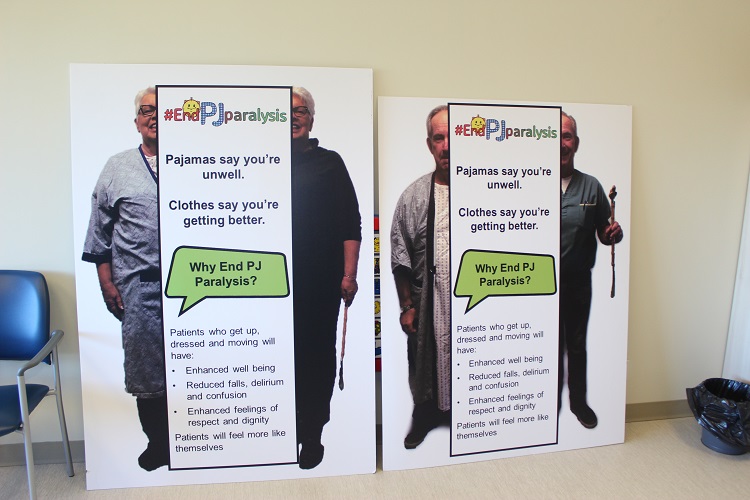The High River Hospital is raising awareness towards a phenomenon known as "Pj Paralysis", which is a termed coined to summarize the negative psychological and physical effects of inactivity while being bedbound and inactive during long hospital stays.
The effects of Pj Paralysis can be mitigated by collaborating with family members of the patient, who can help by bringing in the patients own clothes and encouraging their loved one to walk around the hospital facility to help prevent muscle loss.
According to AHS:
- Bedbound patients may lose up to 5% of their muscle strength for every day they remain inactive in bed.
- Many patient lose the ability to perform normal functions, such as getting dressed and bathing, due to unnecessary bed rest.
- For older patients, losing muscle strength is especially critical, as it can be the difference between dependence and independence.
- Every ten days of bed rest in a hospital is roughly equivalent to ten years of muscle aging in patients over the age of 80.

The event officially launched on Wednesday November 28, where hospital staff decorated the third floor of the hospital with different "locations around the world" and road tape to highlight various tourist hot spots, to help encourage a fun atmosphere that got patients out of bed, walking and socializing.
Healthcare worker for Alberta Health Services at the High River Hospital Cailee DePaoli says she's seen the benefits of getting patients out of bed, first hand.
"We are one of the first sites to launch the awareness campaign for ending Pj Paralysis, it's a really big thing for us. We are trying to encourage families to bring in patients own clothing from home, so they're in their own clothing instead of hospital clothing. We notice a huge difference when this happens, they just look better, feel better, their behavior changes when they're in something that's familiar to them. We notice they are more willing to get up and engage in activities outside of the room, which is the first step to getting them better and heading towards home."
DePaoli says patients and families who take this initiative are able to recover much faster.
"There is a huge difference in recovery times and getting patients home sooner if we can get them up and moving. When your in the hospital you want to lay in bed because you think your sick, but it's really a mindset change in getting people out and moving and back to their normal routines that they would do at home."
Frances, who is a patient at the High River Hospital who is currently recovering from a broken hip, is encouraging other patients to get out of bed, as it has helped her personally.
"As your feeling better and starting to get dressed you get back power of your own, because without that, your dependent on somebody else. It helps you return to normal, use the bathroom on your own and take nice long walks and do what the hospital wants you to do in therapy. Overall it's just a positive experience."
Send us your news tips, story ideas and comments at news@highriveronline.com











